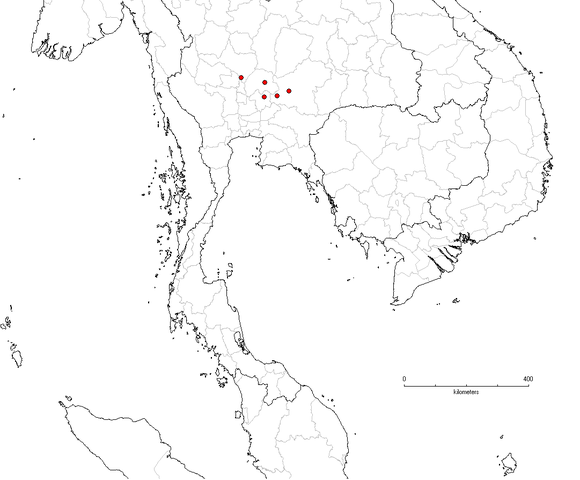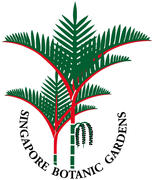Nomenclature
Accepted name/Authority/Place of publication:
Cordisepalum thorelii (Gagnep.) Verdc., Kew Bull. 26: 138. 1971.
Synonyms:
Cardiochlamys thorelii Gagnep., Notul. Syst. (Paris) 3: 136. 1915. TYPE: Laos. Bassac, 1866–1868, Thorel 2625 (holotype: P, photo K; isotype: P, photo K).
Description
Habit:
Liana to 4–6(–8) m long; vegetative parts fulvous to ferruginous; older stems 5-8 mm diam., smooth to slightly striate, dark brownish black, ± puberulous to subglabrous, pith solid; younger stems 1–2 mm diam., herbaceous, terete, tan to brownish, velutinous. Indumentum hairs 2-armed; arms wavy, ± appressed on axial parts, arms erect or ascending on laminar parts.
Leaves:
Leaf petiole 17–43 by <1–2 mm, ± velutinous; blade broadly ovate to attenuate-ovate, 8–11.5 by 4.3–7.6 cm, base subcordate, sinus broad and shallow, apex attenuate-acuminate to subcaudate, adaxially darker, ± velutinous, abaxially grayish, tawny, or rufous, densely woolly; venation with 2 basal pairs and 1 or 2 distal pairs of secondary veins.
Inflorescences:
Inflorescence lax, a simple or compound raceme 25–50 cm long.; lower bracts petiolate, petioles (2–)5–13(–21) mm long, blades broadly ovate, 21–31 by 13–24 mm; upper bracts sessile, ovate, 12–19 by 6–9 mm, diminishing to small scales; pedicels filiform, 3–5 mm, increasing to 8–10(–13) mm in fruit; bracteoles 3, <1 mm long.
Flowers:
Flowers fragrant; buds obovoid or ellipsoid, widest above calyx, apex rounded. Sepals naviculate, ca. 2 by <1 mm; outer 3 obpandurate to narrowly ovate, inner 2 narrowly elliptic-oblong, bases truncate, margins entire, apex acute, outside densely velutinous, inside pilose apically, otherwise glabrous. Corolla cream to pale yellowish; tube 1–2 mm long, glabrous inside and out; limb (5–)7–11 mm diam.; lobes ovate, 3.5–5 by 1.5–3 mm, apex acute to acuminate, both sides densely velutinous-woolly. Stamens < 2 mm long, just protruding from corolla tube; filaments glabrous; anthers broadly ellipsoid, introrse, whitish; pollen 3-colpate, oblate spheroidal, ca. 10 micrometer by 11–14 micrometer, surface psilate or finely granulate, with pilate multiangulate outgrowths within colpi. Pistil ca. 2 mm long, just exceeding calyx, stigma protruding from corolla tube; ovary ovoid, glabrous; ovules 4; style short, terete; stigma biglobose.
Pollen:
Pollen 3-colpate, oblate spheroidal, ca. 10 micrometer by 11–14 micrometer, surface psilate or finely granulate, with pilate multiangulate outgrowths within colpi.
Fruits:
Fruiting calyx clasping utricle; sepals markedly unequal; outer 3 sepals broad ovate-cordate to suborbicular, 21–28(–33) by 19–26(–28) mm, base cordate, lobes approaching or overlapping, margins entire, free, apex emarginate, mucronulate, third sepal folded back on itself along midvein (in dried material); inner 2 sepals linear-spathulate, falcate, 5–7 by <1–2 mm; all sepals chartaceous, stramineous to tan, opaque, reticulate, both sides sparsely pilose. Utricle ellipsoid-fusiform, apiculate, 6–7 by 3– 4.5 mm, borne on a columnar stalk ca. 2 mm long, chartaceous, brownish, smooth or shallowly furrowed, tawny to rufous velutinous.
Seeds:
Seed broadly ellipsoid, 4 by 3.5 mm, dark reddish-brown; hilum basal, ca. 1 mm diam.
References:
Staples, G.W. 2006. Blumea 51: 403–491.
Biogeography, Ecology and Natural History
Distribution Map:

Distribution:
Thailand, Laos, Vietnam; probably also in Cambodia. (Map).
Ecology:
Evergreen forests,
mixed/disturbed and open hardwood forests, often in clearings or along the
margins; seemingly always on limestone. From 25–1200 m elevation.
Phenology:
|
Months |
Jan |
Feb |
Mar |
Apr |
May |
Jun |
Jul |
Aug |
Sep |
Oct |
Nov |
Dec |
|
Flowering specimens |
1 |
1 |
1 |
4 |
5 |
|||||||
|
Fruiting specimens |
1 |
References:
Staples, G.W. 2006. Blumea 51: 403–491.
Other information
Common names and uses:
Rahet khati dong (Thailand, Nakhon Ratchasima), re cai (Vietnam, Moï dialect), ma coi (Vietnam, Moï dialect).
Authorship for webpage
Editor:
George Staples, Esmond Er
Contributors:

Classification:

Add new comment